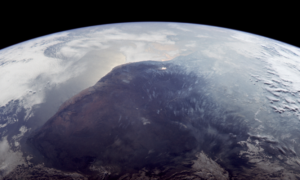Update
International Mother Earth Day

Last updated: 18 Apr 2024
In 2009, the United Nations General Assembly proclaimed 22 April as International Mother Earth Day. In so doing, Member States acknowledged that the Earth and its ecosystems are our common home, and expressed their conviction that it is necessary to promote Harmony with Nature in order to achieve a just balance among the economic, social and environmental needs of present and future generations.
About
In 2009, under the leadership of the Plurinational State of Bolivia, the General Assembly designated through a resolution, 22 April as International Mother Earth Day. The first UN General Assembly Resolution on Harmony with Nature was adopted on 21 December 2009.
Loss of biodiversity, desertification, climate change and the disruption of a number of natural cycles are among the costs of our disregard for Nature and the integrity of its ecosystems and life-supporting processes. Scientific studies identified that a number of planetary boundaries are being transgressed and others are at risk being so in a business-as-usual world. Since the industrial revolution, Nature has been treated as a commodity that exists largely for the benefit of people, and environmental problems have been considered solvable through the use of technology. In order to meet the basic needs of a growing population within the limits of the Earth’s finite resources, there is a need to devise a more sustainable model for production, consumption and the economy as a whole. Devising a new world will require a new relationship with the Earth and with humankind’s own existence.
Resolutions on Harmony with Nature
Since 2009, the aim of the General Assembly, in adopting various resolutions on Harmony with Nature, has been to define this newly found relationship based on a non-anthropocentric relationship with Nature. The resolutions contain different perspectives regarding the construction of a new, non-anthropocentric paradigm in which the fundamental basis for right and wrong action concerning the environment is grounded not solely in human concerns. A step in this direction was further reaffirmed in the outcome document of the United Nations Conference on Sustainable Development (2012), entitled “The future we want”:
We recognize that planet Earth and its ecosystems are our home and that “Mother Earth” is a common expression in a number of countries and regions, and we note that some countries recognize the rights of nature in the context of the promotion of sustainable development.
Roots in Stockholm Conference
The original roots go back to the 1970s when environmental protection was not yet a priority of the national political agendas. The UN Conference on the Human Environment 1972 in Stockholm marked the beginning of global awareness of the interdependence between people, other living species and our planet, as well as the establishment of World Environment Day on 5 June and the UN Environment Programme.
In 1992, the Agenda 21, the Rio Declaration on Environment and Development, and the Statement of principles for the Sustainable Management of Forests were adopted by more than 178 Governments at the Rio de Janeiro Earth Summit, the first major conference in which Sustainable Development was the main issue discussed by member states. From then on, all efforts to conserve the environment experienced exponential growth, like the Earth Summit in Johannesburg in 2002, or the declaration of 2008 as the International Year of Planet Earth.
Observance
The United Nations celebrates this observance through the Harmony with Nature initiative, a platform for global sustainable development that celebrates annually an interactive dialogue on International Mother Earth Day. Topics include methods for promoting a holistic approach to harmony with nature, and an exchange of national experiences regarding criteria and indicators to measure sustainable development in harmony with nature.
On 21 December 2020, the UN General Assembly adopted the twelfth Resolution on Harmony with Nature. This resolution requests the President of the General Assembly, among others, to convene at the seventy-sixth session of the Assembly, an interactive dialogue, to be held at the plenary meetings during the commemoration of International Mother Earth Day in 2022. It invites the participation of the Member States, the United Nations system, independent experts and other relevant stakeholders, to discuss the relationship between harmony with nature and the protection of biological diversity, and to inspire citizens and societies to reconsider how they interact with the natural world in the context of sustainable development.
Building on the eleveneth interactive dialogue of the General Assembly on Harmony with Nature, in July 2022, the Secretary-General published his eleventh report on Harmony with Nature (A/77/244). The report praises the progress in Earth Jurisprudence and the efforts by Member States to create a new narrative for a regenerative world in which Human Rights are strictly linked to the Rights of Nature, and sustainable development is uphold to ensure planetary health and the well-being of future generations.
At the 77th session of UN General Assembly in December 2022, the thirteenth resolution on Harmony with Nature (A/RES/77/169) was adopted, requesting the President of the General Assembly, among others:
- To discuss the possibility of convening and the scope of a high-level meeting, tentatively entitled “Earth Assembly”, to be held on 22 April 2024, so that an evolving non-anthropocentric or Earth-centred paradigm continues to reinforce multilateralism through the discussion of alternative holistic approaches based on diverse world views that may contribute to the implementation of the 2030 Agenda for Sustainable Development17 and beyond.
- Notes with appreciation the proposal by the Head of State of the Plurinational State of Bolivia to establish a group of friends of Harmony with Nature, with a view to making innovative, transformative and action-oriented proposals for responding to present and future challenges, grounded in equity and justice.
International Mother Earth Day 2024
International Mother Earth Day is celebrated this year for the third time within the UN Decade on Ecosystem Restoration. As ecosystems support all life on Earth, the healthier our ecosystems are, the healthier the planet – and its people. Restoring our damaged ecosystems will help to end poverty, combat climate change and prevent mass extinction. → Learn more and answer the rallying call for the protection and revival of ecosystems all around the world, for the benefit of people and nature!
Past GEN Events

Geneva Stockholm+50 Dialogues | Jobs and a just transition for all in a healthy planet
Friday 22 April 2022, 10:00-21:30 CEST | ILO & GEN

A Step Forward for Environmental Rights in Latin America and the Caribbean | 1st Meeting of the Conference of the Parties to the Escazu Agreement in Santiago de Chile (20-22 April 2022)
Earthjustice, Geneva Environment Network, European ECO Forum | 19 April 2022, 14:30–16:00 | Online
Resources
- International Mother Earth Day | Official website
- Harmony with Nature
- Harmony with Nature Knowledge Network
- UN Documents on Harmony with Nature
- Stockholm+50 | Official Website
- Stockholm+50 & Geneva | Geneva Environment Network
- World Environment Day | Official Website
- World Environment Day | Geneva Environment Network
- UN Climate Action
- UN Climate Change
- UN Environment programme
- Convention on Biological Diversity
- Convention to Combat Desertification
- FAO
- Biodiversity and health | WHO
- International Geoscience and Geoparks programme (IGGP) | UNESCO
